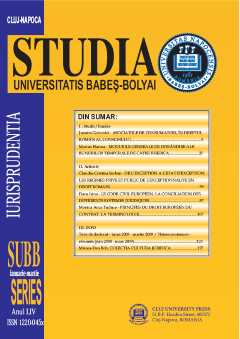JURĂTORII LA ROMÂNI – DESFĂŞURAREA PROCESELOR CU JURĂTORI. PROCEDURA DE JUDECATĂ
ROMANIANS’ SWEARERS – DEVELOPMENT PROCES BY SWEARERS. JUDICIAL PROCEEDING
Author(s): Iosif Florin MoldovanSubject(s): Law, Constitution, Jurisprudence
Published by: Studia Universitatis Babes-Bolyai
Keywords: swearers; tradition; law of the land; origin; oath.
Summary/Abstract: Romanians’ Swearers – Development Proces by Swearers. Judicial Proceeding. In folk culture, the juridical traditions are marks that make evident the form of the Romanian people’s ethnic spirituality. Out of the mystic atmosphere, result of certain protojuridical activities of our ancestors, the land law was born, within the first ethnic communities. This is the background in which in the judicial practice of the Romanian people the swearers’ institution appeared, too. At the beginning, the institution appears conditioned by the relationship between relatives, being the juridical expression of the family solidarity. During this period, the criminal trials were more frequent, so that the family solidarity, materialized by the collective oath, was to be found more in trials of this kind. During the Middle Ages, in the transition period from tribal to feudal relations, the swearers’ institution, turns into the institution of class solidarity. It began to be used in law suits having as object the land and the property right over it. In this way, the swearers and the oath, appear in trials with the specification of judicial proof, functioning as institutions well known by the Romanian people. Many historians and jurists refer to the general characteristic features of the institution, thus showing and trying to prove that it was borrowed from different peoples. The oath, beside the ordeals, was thought to ensure the truth discovery by the miraculous intervention of divinity, that punished the guilty person and defended the unguilty one. It was thought that the person who swore false, drew upon him the divine punishment. Due to this belief in divine power, the oath took place in a well established ceremony. Taking oath was a solemn action. He who swore false, beside the divine punishment, was also punished by the community leader. The swearers were chosen in accordance with the type of litigation that had to be judged : from the ruling class or according to the way the leader of community wanted to dispose its classification. In the penal one, the claimant was obliged to bring swearers for the oath to be taken. In the civil one, they were chosen according to the written decision. In the old law, the accused were not obliged to prove their innocence before the claimant proved his claim, as it happened with the Germanic peoples. The claimant had the task to prove the claim with witnesses and documents. Judicial organization and proceedings were almost the same in Wallachia and Moldavia. The prince had absolute power, of divine origin, the parties having to show respect towards the supreme judge. Even the great boyars, if they were party in the trial, had to appear before the prince, showing respect to the judge and the judgement. In Moldavia, the judgement started with the exposition of the claimant’s claim followed by the accused person’s defence. The proofs asked by the parties were then shown. That was the moment the swearers appeared.
Journal: Studia Universitatis Babes Bolyai - Iurisprudentia
- Issue Year: 57/2012
- Issue No: 2
- Page Range: 198-219
- Page Count: 22
- Language: Romanian

